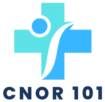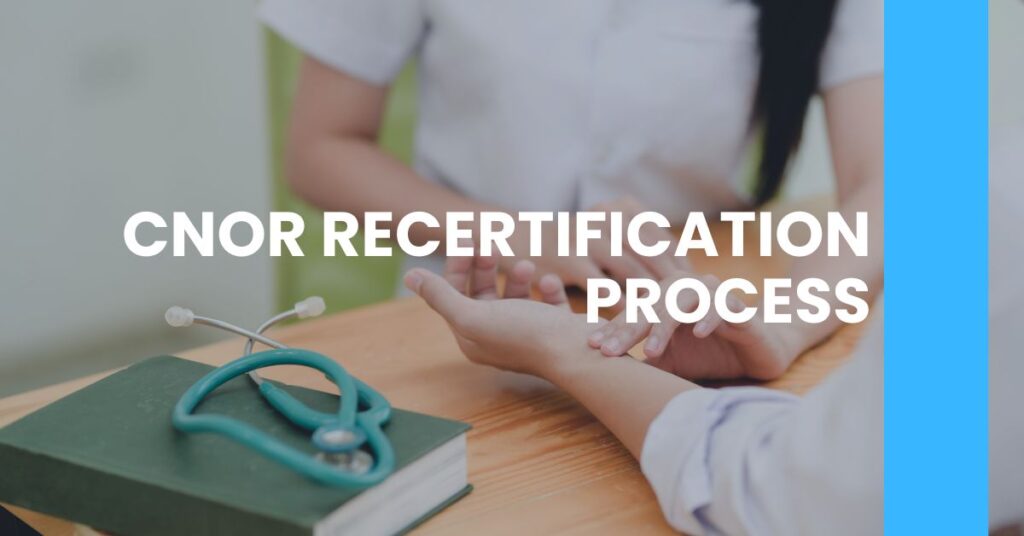Streamline your CNOR Recertification Process with ease and efficiency.
- Eligibility Criteria: Understand the qualifications needed for CNOR recertification.
- Timeline & Accrual Period: Keep on track with the scheduling and accrual requirements for perioperative nursing credentials.
- Professional Activity Points: Maximize your continuing education efforts to accumulate necessary recertification points.
Navigate the CNOR Recertification Process confidently and successfully.
- Understanding CNOR Recertification
- Eligibility Criteria for CNOR Recertification
- Recertification Timeline and Accrual Period
- The Role of Professional Activity Points in Recertification
- Recertification by Continuing Education
- Choosing the Right CE Options
- Recertification Alternatives
- Documenting Professional Activities and Education
- Application and Fees for Recertification
- Preparing for the CNOR Exam If Retaking
- Keeping Track of Recertification Deadlines
- Conclusion: Staying Ahead in Perioperative Nursing
Understanding CNOR Recertification
For perioperative nurses, obtaining the Certified Nurse Operating Room (CNOR) credential is a significant achievement that acknowledges your expertise in the surgical nursing field. But like any major accomplishment, it’s not a one-time event. To maintain the credential, you must navigate the CNOR recertification process diligently.
Recertification is not just a formal requirement; it’s a commitment to professional development and evidence of your dedication to patient safety and the highest standards of care. Let’s delve into what recertification entails and why it’s a vital component of your nursing career.
Staying Certified: The Recertification Imperative
When you first earned your CNOR credential, you demonstrated a specific level of knowledge and competence. However, the healthcare industry is dynamic, with new technologies, procedures, and practices emerging continually. The CNOR recertification process ensures that you stay current with these developments and continue to meet the competencies required in the perioperative nursing practice.
The Value of Recertification
By recertifying, you signal to employers, colleagues, and patients that you are updated on best practices in perioperative nursing. It’s an investment in your career that can lead to recognition, professional growth, and potentially advancement opportunities. As a CNOR-certified nurse, you are part of an elite group of professionals committed to nursing excellence.
Eligibility Criteria for CNOR Recertification
To begin your journey toward CNOR recertification, first ensure that you meet the necessary criteria. The Competency and Credentialing Institute (CCI) has outlined specific requirements that must be fulfilled:
- Current RN License: You must hold an unrestricted RN license to practice nursing.
- OR Experience: Accumulate a minimum of 2,400 hours of experience in perioperative nursing.
- Continuing Education: Complete at least 30 hours of continuing education contact hours related to perioperative nursing.
Experience in the Field
The perioperative nursing experience is a key aspect, ensuring that you are not only knowledgeable but also practically proficient in the OR environment. This experience also demonstrates your ongoing engagement and direct involvement in the perioperative nursing field.
Continuing Education: A Lifelong Journey
Perioperative nursing education shouldn’t stop after certification. The continuing education requirement underscores the importance of lifelong learning and keeping pace with the ever-evolving nature of healthcare.
Recertification Timeline and Accrual Period
Understanding the recertification timeline is crucial for maintaining your CNOR status without interruption. The recertification cycle lasts five years, providing you with a generous window to accrue your professional activity points or continuing education contact hours.
You must begin planning for recertification well in advance of the deadline. Let’s break it down:
- Accrual Period: This is the five-year window immediately following your initial certification or your last recertification. It’s during this time that you must accrue the necessary professional activities and continuing education.
- Application Period: You can submit your application for recertification between January 1 and December 31 of the year your certification expires. Plan accordingly to avoid a lapse in certification.
Time Management and Strategic Planning
While five years may seem like a long time, it’s essential to manage this period strategically. Engage in qualifying activities and courses throughout this period instead of leaving it to the last minute, which can cause unnecessary stress and potential pitfalls.
The Role of Professional Activity Points in Recertification
Professional activity points play a pivotal role in the CNOR recertification process. They underline a multifaceted approach to professional development – beyond traditional classroom education. There are myriad activities that can earn you points, such as:
- Precepting: Mentoring new perioperative nurses not only contributes to the development of the workforce but also earns you valuable points.
- Committee Service: Engage in leadership roles or committee participation to both shape policy and practice and contribute to your recertification.
- Academic Achievement: Pursuing higher education or conducting research are commendable ways to earn points.
Maximizing Your Points
Each activity carries a pre-determined number of points, and every nurse can develop a unique combination that suits their career trajectory. For example, the Competency and Credentialing Institute equates 50 contact hours to 100 professional activity points, offering you flexibility in how you accumulate your points.
Tailoring Your CNOR Recertification Journey
Your professional activities reflect your interests, strengths, and career goals. By aligning the activities with your personal development plans, the process of accruing points can be both enriching and enjoyable.
Recertification by Continuing Education
Besides accumulating professional activity points, you can also recertify by completing continuing education (CE) courses. These courses help you stay abreast of the latest advancements in perioperative care, patient safety, and nursing leadership.
- Recognized Educational Programs: The CCI accepts various forms of educational content, such as workshops, conferences, webinars, and self-study courses relevant to perioperative nursing.
- Documentation and Proof: Gather certificates or attestations as proof of course completion. You’re required to retain these records as they must be presented upon CCI’s request.
The Importance of Accredited CE
It’s important that the continuing education programs you select are accredited by relevant professional nursing organizations. This ensures that the content has been vetted for its quality and relevance to the perioperative nursing field.
Choosing the Right CE Options
With a multitude of CE opportunities available, select courses that not only fulfill your recertification requirements but also ignite your passion and enhance your expertise. Whether it be a deep dive into a surgical specialty or a course on leadership, each educational endeavor should contribute meaningfully to your professional journey.
Recertification Alternatives
For some perioperative nurses, the traditional path of accumulating professional activity points or continuing education contact hours may not be the most viable option for CNOR recertification. Understanding this, the Competency and Credentialing Institute (CCI) has established alternatives for maintaining your valuable credential.
Retaking the CNOR Exam
The most straightforward alternative is to retake the CNOR exam. This is a suitable choice if you:
- Prefer Testing Over Coursework: If you thrive in test environments and want to test your knowledge directly, this option might be best for you.
- Seek To Refresh Knowledge: Retaking the CNOR ensures a comprehensive review of perioperative nursing principles, allowing you to refresh your knowledge base thoroughly.
Seeking Extension
In unforeseen circumstances where you cannot meet the recertification requirements within the designated timeline, an extension can be requested. CCI provides details on eligibility for extensions, and it’s an option worth exploring if life events have disrupted your ability to accrue points or complete education.
Attaining Emeritus Status
For retiring nurses who have greatly contributed to the field and wish to retain a professional affiliation, the CCI offers an Emeritus status. This is a form of recognition for your years of service and contributions while maintaining a connection to the perioperative community.
Documenting Professional Activities and Education
Proper documentation is the backbone of the CNOR recertification process. Thoughtful record-keeping ensures that when it’s time to recertify, you have all necessary proof readily available.
Keeping Records
The CCI requires specific details for each professional activity and educational endeavor you wish to submit for credit, including:
- Dates of Activity: Ensure you note the exact dates you engaged in each eligible activity.
- Certificates or Transcripts: For educational programs, certificates or official transcripts act as your proof of completion.
- Detailed Descriptions: Provide detailed descriptions of professional activities, supported by signed attestations where necessary.
Be mindful to observe CCI’s guidelines for documentation to ensure your efforts are recognized without issue.
Application and Fees for Recertification
When it’s time to submit your application for CNOR recertification, you’ll want to be prepared with all your documentation and aware of the associated cost.
Online Application Process
CCI has streamlined the application process to be completed online. Your part in this process will involve:
- Gathering Documentation: Have all required records and proof of professional activities and continuing education on-hand.
- Completing the Application Form: Fill out the recertification application meticulously, as errors can lead to delays.
Understanding the Fee Structure
The fee for recertification is a necessary part of the process, but planning ahead can save you money:
- Early Bird Discounts: There are often discounts for submitting your application well before the deadline.
- Budgeting: Staying informed of the fee schedule allows you to budget accordingly over the accrual period.
Preparing for the CNOR Exam If Retaking
If you choose to recertify by retaking the CNOR exam, preparation is key. Adequate preparation not only bolsters your chances of success but can also refresh and enhance your perioperative knowledge.
Resources for Review
To help you prepare, consider utilizing resources such as:
- Prep Courses: Engage in a reputable Prep for CNOR Online program to cover major content areas.
- Study Guides: Review guides that focus on the CNOR exam blueprint, outlining the domains of practice you’ll need to master.
- Practice Tests: Gauge your readiness with practice tests that simulate the exam experience.
Formulating a Study Plan
A structured study plan can help you:
- Set Goals: Identify key topics you need to focus on and set achievable learning goals.
- Review Regularly: Incorporate periodic review sessions to reinforce your understanding over time.
Keeping Track of Recertification Deadlines
Staying ahead of deadlines is a crucial part of the CNOR recertification process. As you juggle work and personal commitments, keeping a close eye on important dates will ensure you remain certified without disruption.
Utilizing Tools and Resources
Keep track of your timeline with:
- Calendars: Mark important dates on a digital or physical calendar as soon as you start your accrual period.
- Reminders: Set up reminders for course completion, documentation submission, and application deadlines.
Conclusion: Staying Ahead in Perioperative Nursing
Navigating the CNOR recertification process successfully is not just about fulfilling obligations; it’s about affirming your commitment to excellence in perioperative nursing. It’s essential to recognize that recertification bolsters your credibility, enhances your knowledge, and reaffirms your dedication to quality patient care.
Continue to invest in yourself and your professional growth. Embrace lifelong learning as a cornerstone of your career, and let the CNOR recertification process be a structured pathway to ensuring you are always at the forefront of perioperative nursing practice.

